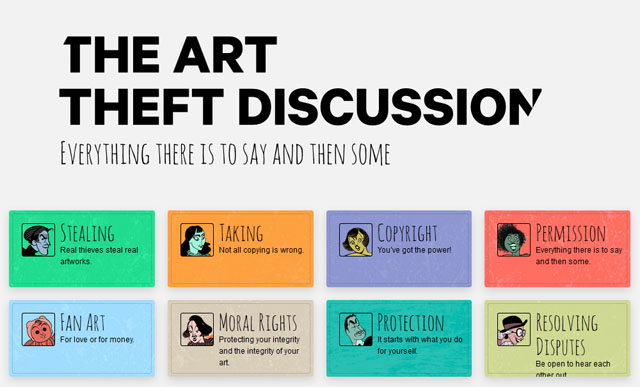 The art website Deviant Art has started a discussion on Art Theft with eight articles on Copyright infringement and related topics that effect digital artists on the internet. Based on the comments, the articles are extremely controversial, especially the one on Stealing, where they separate the concept of stealing from copyright infringement. I’m glad to see this. Copying may be wrong or even illegal, but it’s not stealing. Stealing is taking something away from someone. When a copy is made the person still has the original. If we’re going to build a future in our changing times where artists are paid and treated fairly, then we are going to have to start by being specific about what we are talking about. Words have meanings.
The art website Deviant Art has started a discussion on Art Theft with eight articles on Copyright infringement and related topics that effect digital artists on the internet. Based on the comments, the articles are extremely controversial, especially the one on Stealing, where they separate the concept of stealing from copyright infringement. I’m glad to see this. Copying may be wrong or even illegal, but it’s not stealing. Stealing is taking something away from someone. When a copy is made the person still has the original. If we’re going to build a future in our changing times where artists are paid and treated fairly, then we are going to have to start by being specific about what we are talking about. Words have meanings.
About 15 years ago the music industry went bananas over Napster and started the incessant drumbeat claiming that copying and stealing are the same thing. Now there is a generation of people who can’t tell the difference and I can see a lot of that in the angry comments on Deviant Art. But the music companies didn’t want to build a future for artists. They wanted everything to stay the same so they could keep their revenue streams. They just wanted people to stop copying so they came up with a dramatic short cut to re-frame the discussion and shut it down. Copying is stealing and that’s that. Well it’s not, and the reality is much more complicated.
And change isn’t going to stop either. As artists we need to take charge of this discussion because it’s up to us to build the future for ourselves. Let’s say what we mean and mean what we say, and not fall into the trap of using language that was designed to stop the discussion and stop change.
I think your analogy is a bit disingenuous. If a person or a business is making money off of selling an IP that they have full legal rights to and you make a copy off of someone where you never had a copy before, you ARE stealing from the rights holder. You’re stealing their sale of a copy of their IP work.
If you went into a bookstore and took pictures of every page of a book or magazine, the bookstore may still have the physical book/magazine, but you HAVE deprived them of the revenue generated from the sale they SHOULD have had of that product if you wanted to peruse it.
Same digitally.
Except I’m not making an analogy, you are. You are saying copying media and stealing money are equivalent. They aren’t. It’s much more complicated than that.
The bottom line is copying is easy and few artists have the resources to stop it. If we are going to be compensated fairly we have to build a business infrastructure around us that takes this new situation into account. That starts with an honest and direct discussion of the problems and opportunities of the new digital world. Twisted language designed to deny how the world has changed prevents that discussion from moving forward.
I agree there’s a distinction between copying and stealing. It’s like the distinction between buying and licensing. Many people will say they’ve bought something when in fact they’ve only licensed it. I’ve even seen publishers who think they can do anything they want with an image or other intellectual property because they have “paid for it,” even though they were soliciting material for a specific magazine, anthology, or other collective work. It is unfortunate that the language used by the masses concerning the use of intellectual property only serves to strengthen their incorrect views about it.
It complicates matters that there is nothing to own or steal when it comes to digital media except for a license. There is no physical product. All you can really do is copy the pattern of ones and zeroes that the artist has defined as their work, possibly transforming the pattern during the copy (as when converting from JPEG to PNG, for instance). The question then is whether you have a licensed copy of the pattern.